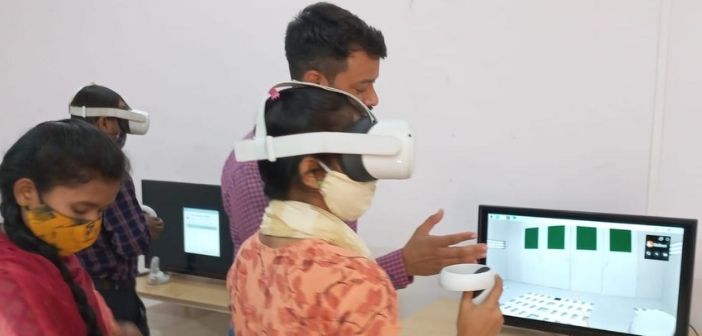
Painting is not just a child’s hobby but can also become a career option with the right set of skills and training. And the Paints and Coatings Skill Council is promoting skill development and entrepreneurship in the sector to make it more aspirational for the youth. The industry-relevant training and skill development initiatives from the Sector Skill Council (SSC) are driving the informal sector towards formalization, to some extent, if not completely.
To know more about the skill development initiatives and the scope of the paints and coatings sector in terms of jobs and careers, we conversed with Mr Jagadish Acharya, CEO, Paints and Coatings Skill Council who shared the journey of the SSC and the future road-map.
Below are a few excerpts from our conversation. You can watch the full video on our YouTube channel.
Q. Looking back at PCSC’s journey so far (since 2015), could you share some of your initiatives and achievements in these years?
A: Ages ago, paints, created from various natural and animal products, were used for various purposes and one of them was communication. With the availability of more resources and raw materials and the knowledge to use them correctly, the sector has evolved to the current stage. And with the continuous disruption of new-age technologies, it is expected to grow even further in the future.
Painting primarily caters to three main attributes:
- It can be used as a protective coating on surfaces to avoid deterioration
- To decorate the walls
- Functional purposes like road marking paint, colour coding of pipes refineries or school buses
Painting a vehicle or a newly build house is extremely crucial as it changes their entire appeal. Their values will be minimised otherwise. So, painting is more valuable than it is believed to be. And the demand and value have created a huge market potential for the sector in India which is expected to witness tremendous growth in the future as well.
And with the growing market, the demand for skilled painters is also increasing. Currently, there are nearly 20-25 lakhs of painters are employed in this informal sector.
Decorative coating is a large part of a job role along with industrial coating, marine applications, wood polishing and so on. Hence, there are many applications in the paints sector, so we have job roles designed for each one of them. Paint manufacture is a kind of sector that requires skills, knowledge etc.,
After our QP-NOS got the recognition in 2018, we started with the formal training modules to skill people in the sector. And despite the COVID-19 pandemic, we have done over 70 thousand training in the last two years. This has been mainly possible because of the PMKVY and State Skill Development Mission initiatives.
Q. Please tell us more about industry participation in skilling at various levels in this sector?
A: We had tremendous support from the industry and we have a strong industry linkage. Most of our trainers and leaders have decades of industry experience. Indian Paint Association is our parent body and we also have ties with the Indian Small Scale Paint Associations. Our strong industry connection is helping us understand the industry needs and also helping us align our training modules to the current industry demands. We are also getting support from industries to participate in the IndiaSkills competition and the WorldSkills competition.
Q. Since this sector is highly informal and unorganized, how are you creating awareness of RPL and formal certification?
A: Out of the 70 thousand RPLs we have done, 20 thousand have come from Tamil Nadu state alone as we got some target from that state development corporation. Now, there is a bridge course of 12 hours in which we were able to give soft skills training, domain-related training. We also gave certificates to the trainees by arranging an event to build confidence in them.
When it comes to skilling and certification, a certified painter is now recognized by the contractors who undertake jobs and hire people. When painting companies train these painters, they earn more money and have a better chance of employment than before.
 Q. What is the future of apprenticeships in the paints and coatings sector?
Q. What is the future of apprenticeships in the paints and coatings sector?
A: We released a book on an apprenticeship at an industry paint conference. Apprenticeship programmes are discussed in every official meeting. Youth go through the apprenticeship programme and then get a job. The painting job is considered an informal sector of sub-contractors. So, we should bring them to the mainstream sector and formalize them and apprenticeship might help us in the formalization of the otherwise informal sector.
Q. How has technology adoption in the industry impacted skilling and employability and what is the roadmap for PCSC in the coming years?
A: We have been leveraging many new-age technologies to provide training to our students. There are stimulators used to teach spray painting and other skills as well. We were approached by an NGO in a tribal area near Maharashtra for training the youth in painting. We have suggested the institution to use simulators to train their students and helped them with the training. Simulators help you learn the art of spraying and painting without spilling a drop of paint. Now, some children have reached level five in spray painting training. It is also used for industrial and automotive painting.
We are also engaged with the software developers who can provide mobiles for the painters. The applications on the mobile help them to ease the selection of colours. While leveraging the benefits of technological advancement, we still have to keep in mind that painting is 70% practical based skill and students need hands-on experience to get fully skilled.
Q. Do you see the painting in the vocational education curriculum right from schooling?
A: Children love to play with colours and are a skill that can be learnt from schooling. However, parents are reluctant to send their children towards a painting career as they use toxic materials. Hence, we are now using environment-friendly paints to let children choose this sector. We have modules for schools that create awareness.
Countries like Europe, Australia, and America have already progressed from choosing it yourself to buying it yourself to doing it yourself. However, India is not yet there. At the same time, as painting is a complex job, a master painter is always there to guide. Familiarizing students with the paint industry from a young age would create interest and aspiration for those who find this industry exciting. And doing so would also enhance the dignity of labour in the sector.
Q. How was the performance of the participants in IndiaSkills Competitions; how do you plan to use the competitions to create awareness and make skills aspirational?
A: We are proud to participate in the IndiaSkills competition. We have identified three people through a range of state-wise competition that was held for a period of five to six months. They are now getting trained by Bajaj painting, Calcutta and we ensure that our participants will reach the WorldSkills competition.
Also Read: Skill development in the Paints and Coatings industry: A Skill Talk with Mr. Jagdish Acharya, CEO, Paints and Coatings Skill Council (PCSC) https://nationalskillsnetwork.in/skill-development-in-the-paints-and-coatings-industry-a-skill-talk-with-mr-jagdish-acharya-ceo-paints-and-coatings-skill-council-pcsc/
Q. Do you wish to share anything else with our audience?
A: Thankfully, the skill ecosystem is being recognized because of the government incentives and commitment to making India the skill hub of the world. The education system is now accepting skills as an important part of the education of children. There are various skills for the youth to learn and get a job in any role including painting. The skill councils are now approving this kind of training and the education system is also giving credits through which you can become a graduate or a diploma holder.
This is the right time for the youth to seize the opportunity and commit to robust assessments that are worthy of getting a job.













